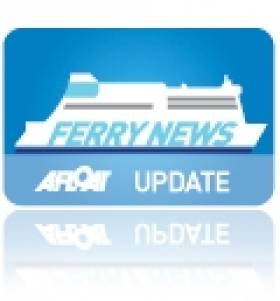Displaying items by tag: Roscoff
Irish Ferries Recognition of 20 Years Service At Roscoff
As part of celebrations to mark the 20th anniversary of Irish Ferries' services from Rosslare to the French port of Roscoff, a civic reception – attended by the mayor of Roscoff Mr. Joseph Seité and other local dignitaries, chamber of commerce officials, commercial, maritime and tourism representatives from the French region and members of Irish Ferries’ management – was held on board the company’s vessel Oscar Wilde.
During the course of the event, Irish Ferries was praised for the contribution that it makes in promoting tourism and trade in Roscoff and throughout the wider Brittany region and for the investment it has made over the course of two decades, both at sea and ashore.
Pictured at the event is Irish Ferries Managing Director Andrew Sheen, Captain Steven O’Mara and Ole Bockmann who, since the early days of direct car ferry services between Ireland and France, has been director of operations for Irish Ferries at the ports of Cherbourg and Roscoff.
Disruption Continues on Brittany Ferries Services
#FERRY NEWS - Industrial action by French crews with Brittany Ferries is still disrupting the company's ferry services from Cork to Roscoff.
As previously reported on Afloat.ie, a series of wildcat strikes by staff protesting against changes to their working terms and conditions began last Friday 21 September.
The action led to the cancellation of sailings on the weekend-only round-trip Cork route until further notice.
Passengers intending to travel from Cork have been advised to seek passage instead on Celtic Ferries' Rosslare-to-Cherbourg route or Irish Ferries' Rosslare services to Cherbourg.
Ferry-Go-Round on the Irish Sea
In the case of Irish Ferries, their Rosslare-Pembroke Dock route vessel, Isle of Inishmore arrived on the Mersey yesterday at the Cammell Laird dry-dock facility in Birkenhead.
The 1997 Dutch-built Isle of Inishmore had relieved the 50,938 tonnes 'flagship' Ulysses from the Dublin-Holyhead route which too had gone to Birkenhead for maintenance since January 4th.
The Ulysses is now back on service and the company's French routes cruiseferry, Oscar Wilde is covering the Isle of Inishmore's absence from Rosslare-Pembroke Dock sailings.
Continental services to France on the Rosslare-Cherbourg route will resume on February 16th when the Oscar Wilde returns from her overall. The Bahamas flagged vessel will re-open seasonal Rosslare-Roscoff sailings starting on May 13th.
In addition to conventional tonnage Irish Ferries also operate the fast-craft catamaran Jonathan Swift in tandem with Ulysses on the Dublin-Holyhead route. The Ulysses takes 3 hours 25 minutes while the 39-knot catamaran craft marketed as the Dublin 'Swift' is advertised with a scheduled passage time of 1 hour and 49 minutes.
The Australian-built catamaran was taken off the central corridor route yesterday to be drydocked also in Birkenhead until January 18th. Dublin Swift sailings return to the Dublin-Holyhead route on February 19th with the first crossing to depart at 14.30 hours from the capital port.
For the latest information on ferry sailings and reservations click: www.irishferries.com
Rosslare Europort
Rosslare Europort
Rosslare-Europort is located on the south-eastern tip of Ireland, and is the closest point in the south of the country to the UK and continental Europe.
There are regular sailings to Fishguard (with Stena Line); to Pembroke, Cherbourg, and Roscoff (with Irish Ferries); to Cherbourg (with Celtic Link Ferries); and to Le Havre (with UECC).
Rosslare-Europort, being the closest point from the southern part of Ireland to the UK and the European Mainland, is a hub of all the major RORO Passenger and Freight services operating the southern Irish Sea and Continental routes.
Enquiries relating to timetables, rates, fares, etc. on existing services should be addressed directly to the relevant shipping line (contact information is available on their respective websites – see links below).
Ferry Reservations – Please visit our partner site, aferry.to, to find out about the route schedules and booking information.
Getting to/from Rosslare Harbour by Sea – There are regular services to Cherbourg, Fishguard, Le Havre, Pembroke, and Roscoff. Book a sailing here.
Getting to/from Rosslare Harbour by Rail – There is a railway station in the port itself, Rosslare-Europort station. There are services to Dublin, Waterford, Cork, Kerry, and Limerick. See Irish Rail's website for more information.
Getting to/from Rosslare Harbour by Bus – Bus Eireann provide good services at Rosslare, linking it with Dublin, Cork, Waterford, Wexford, and it is possible to get connecting buses from there to your final destination. For more information, see Bus Éireann's website.
Getting to/from Rosslare Harbour by Car – Rosslare Harbour is located on the N25 route, which runs across the south of the country, connecting Rosslare with Waterford and Cork. If travelling from Dublin, take the N11 south to Wexford, from where you can turn onto the N25 east to Rosslare Harbour. If hiring a car, check out our car hire guide.
Rosslare Harbour Accommodation – Please see our Rosslare Harbour Accommodation page.
More Information – Rosslare Europort is operated by Iarnród Éireann (Irish Rail), and more information can be found on their website.
Trade enquiries regarding port access, rates, etc. should be addressed to:
Rosslare Europort John P Lynch, General Manager Rosslare Europort, Iarnród Éireann, Terminal Building, Rosslare Europort, Co Wexford. Tel: +353 (0) 53 915 7970 , ax: +353 (0) 1 886 0511 , or email: [email protected]































































